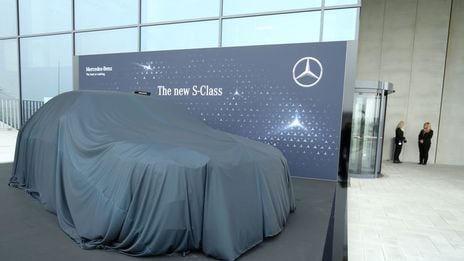(New: Statements Wilhelm from calls, price and analyst opinion.)
STUTTGART (dpa-AFX) - After a good start to the new year, carmaker Mercedes-Benz is confident that it can do a little better, despite a bleak economic outlook. The management around CEO Ola Källenius sees itself confirmed in its strategy focused on luxury cars - the Swabians are currently still getting away with price increases and the high demand for the particularly expensive cars among customers. In the rest of the year, too, the Stuttgart-based company intends to more than make up for rising costs with higher prices and is becoming somewhat more confident in its main divisions.
In the core passenger car business, CFO Harald Wilhelm now expects the annual profitability outlook to be at the upper end of the previously expected targets. Following the strong start for vans, he has raised the outlook for the van division completely. However, Mercedes shares fell in the course of trading.
The stock fell 0.9 percent to 69.42 euros at midday in a weaker industry environment. Mercedes had already presented preliminary figures last week and thus exceeded the expectations of analysts in the market. This year, the share price has risen 13 percent.
Goldman Sachs analyst George Galliers had expected higher headwinds from manufacturing costs in the passenger car division and a lower profit contribution from China. Philippe Houchois of investment bank Jefferies spoke of strong results in detail. Daniel Schwarz of Stifel estimates that market expectations are now rising.
"The focus on top-end passenger cars and premium vans has made Mercedes-Benz more weatherproof," finance chief Wilhelm said Friday. As a result, he said, Mercedes can accelerate its expensive transformation toward digital connectivity and electric cars even in times of economic uncertainty. In addition to the introduction of new, expensive cars, cost discipline is also keeping the group on track, he added.
In cars, the DAX-listed group is now assuming the upper end of the forecast range of 12 to 14 percent for return on sales before interest and taxes adjusted for special items. In the Van division, management is raising the outlook to an operating margin of 11 to 13 percent, compared with the previous target of 9 to 11 percent.
For the Group as a whole, the previously formulated targets remain unchanged - for example, the expected "slight" decline in earnings before interest and taxes. However, within the minus 15 to minus 5 percent range meant by the language, Mercedes should also reach the upper end of the range, Wilhelm said. He is thus looking in the direction of the minus 5 percent.
As already known, Mercedes had sold 503,483 cars in the quarter including the Smart small car brand, 3 percent more than in the same period last year. There was a much stronger increase of 89 percent in all-electric passenger cars to 51,639 cars. At the Mercedes brand alone, the increase in battery-powered cars (BEVs) was even stronger - they thus accounted for a tenth of all vehicles sold with the star.
Above all, Källenius and Wilhelm are also pleased that the high-yield luxury models continued to do well; they fetch the highest prices. In the self-declared top-end segment, Mercedes groups together the company's own flagship S-Class and its electric variants as well as the AMG and Maybach sub-brands; the G-Class SUVs and the large GLS SUVs are also included. Mercedes was able to sell 18 percent more in this segment.
Things did not go quite as smoothly for the highest-volume models, such as the E-Class. Sales in the mid-size segment fell significantly, which the company attributed to model changes in the E-Class cars and the GLC compact SUV.
Overall, however, Mercedes was not quite able to maintain the extraordinarily high operating margin for passenger cars from the prior-year quarter, as already announced. In particular, the division incurred higher research and development costs, which rose by almost a quarter. However, Mercedes increased the operating profit of the van division by more than half.
Total sales climbed 8 percent in the first three months, more than unit sales, to 37.5 billion euros. Higher average selling prices more than compensated for rising material costs, according to the figures. Earnings before interest and taxes adjusted for special items increased by 2 percent to 5.42 billion euros. Net profit increased by 12 percent to 4.01 billion euros. Mercedes achieved slightly better net interest income and had to pay slightly less in taxes. The investment in Daimler Truck delivered more earnings than a year earlier.
The sale of the Russian subsidiaries to local dealer Avtodom is expected to have a low triple-digit million euro effect on the balance sheet in the second quarter, according to Wilhelm. There is also a buyback option, he said. However, given the geopolitical situation, Wilhelm said he does not expect it to be pulled. Shortly after the Russian war of aggression began in February 2022, Mercedes had stopped its exports to Russia as well as production there. The sale had already been announced last fall, and was completed in April./men/mis/jha/




